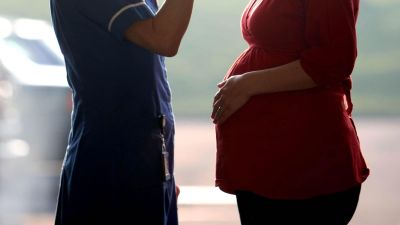Expectant mothers 'anxious and uncertain' after hospitals suspend gas and air use

By Lottie Kilraine, Multimedia Producer
Expectant mothers have been left "anxious and uncertain" after several NHS Trusts in England imposed a temporary ban on a popular form of pain relief over concerns about midwife safety.
The use of gas and air - half nitrous oxide, better known as laughing gas, and half oxygen - during labour is one of the most popular pain relief options for women giving birth.
One first time mother-to-be said a lack of warning around the decision to suspend offering it has left her with "less than a week to completely re-evaluate my birth".
There are no harmful side effects of using gas and air (known as Entonox) for a mother or baby, however safety concerns have been raised about the overexposure for midwives and hospital staff.
North West Anglia Foundation Trust Maternity Services was one of the NHS Trust's to announce a temporary suspension of Entonox in their Peterborough and Hinchingbrooke Hospitals via their Facebook page.
The Trusts' original post sparked concern among pregnant women and midwives who complained of a lack of communication involving the decision.
The original statement posted on Friday had read: "There is no risk to women or babies using Entonox during labour but after testing the air quality in our maternity units, we have identified a potential risk of prolonged exposure for our staff.
"We have therefore made the decision to temporarily suspend the use of Entonox in our maternity units with immediate effect to protect our midwifery, nursing and medical teams."
To which one expectant mother responded: "Fully supportive that staff need to be protected. Just a little (lot) anxious now as first baby due in a few days.
"Hoping little one holds on long enough we get to talk through it with someone before we get there...trying out the breathing so panic attack doesn't bring on labour early! Less than a week to completely re-evaluate birth!" she added.
If you would like to share your experiences of the NHS please email the ITV News health team at itvnewshealth@itn.co.uk
Meanwhile another Facebook user said: "As well as terrifying hundreds of heavily pregnant vulnerable women, we as midwives are now concerned about what these risks are?
"I am also appalled that you have chosen to post this on a Friday evening when none of these women will be able to speak to their community midwife and no management will be in over the weekend to support those who are concerned."
The following day the Trust issued an apology saying they were "extremely sorry for the anxiety and uncertainty" the announcement had caused but did not reverse the suspension.
"It was not a decision made lightly and is based on expert external advice which we cannot ignore," the updated Facebook post read.
The Trust said on Tuesday it is now working to safely reintroduce Entonox to the maternity units as soon as practically possible, but added: "Sadly this is not something we can do overnight."
While it does not remove all pain, gas and air can help make it more bearable during delivery and can take as little as 15 seconds to start working when breathed in through a mask or mouthpiece.
In a survey of more than 16,600 women who gave birth in 2022, the Care Quality Commission found that 76% of respondents used gas and air at some point during labour.
It is understood that issues can stem from poor ventilation within maternity units which can cause nitrous oxide levels to build up, meaning staff risk being overexposed.
Many hospitals use a piped supply, but some use a mix from cylinders - and that method is understood to leave behind higher levels of nitrous oxide in the air.
Earlier this month, the Princess Alexandra Hospital in Harlow, Essex, reversed a decision to ban the use of gas and air after hospital bosses said there was "no risk" to mothers, babies or staff.
The withdrawal followed similar concerns at Ipswich Hospital in Suffolk and Basildon Hospital in Essex.
Ipswich Hospital reintroduced gas and air at its maternity unit on February 3 after new ventilation units were put in place.
National Childbirth Trust (NCT) Practice Manager Val Willcox told ITV News: "Pregnant women who are planning a vaginal birth at the affected hospitals may be worried or anxious if they were expecting to have access to gas and air for pain relief.
"We'd encourage anyone who is concerned, to speak to their midwife about alternative pain relief options or consider transferring their care to another hospital.
"There are no long-term health risks to labouring women who use Entonox, but the health and safety of midwives who may be exposed to it on a daily basis is paramount.
"Hospital trusts need to urgently look into how to make the environment in maternity wards and birth centres safer, so that midwives are protected and women in labour have more choices around pain relief."
NHS England told ITV News there is no national ban on the use of gas and air for women going in through labour.
An NHS England spokesperson said: “NHS England has been working with the Trusts where gas and air supplies have been affected due to differing and localised issues – this is not a widespread issue and patients should continue to access services as normal.”
Want a quick and expert briefing on the biggest news stories? Listen to our latest podcasts to find out What You Need To Know...